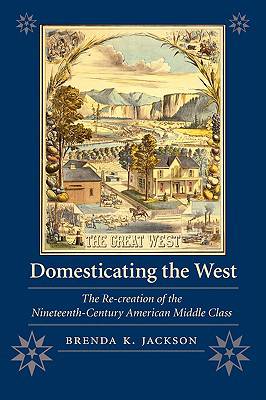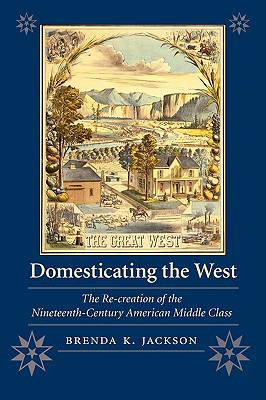
Bedankt voor het vertrouwen het afgelopen jaar! Om jou te bedanken bieden we GRATIS verzending (in België) aan op alles gedurende de hele maand januari.
- Afhalen na 1 uur in een winkel met voorraad
- In januari gratis thuislevering in België
- Ruim aanbod met 7 miljoen producten
Bedankt voor het vertrouwen het afgelopen jaar! Om jou te bedanken bieden we GRATIS verzending (in België) aan op alles gedurende de hele maand januari.
- Afhalen na 1 uur in een winkel met voorraad
- In januari gratis thuislevering in België
- Ruim aanbod met 7 miljoen producten
Zoeken
Domesticating the West
The Re-Creation of the Nineteenth-Century American Middle Class
Brenda K Jackson
€ 30,45
+ 60 punten
Omschrijving
In 1881 Thomas and Elizabeth Tannatt said a final good-bye to Massachusetts and the eastern seaboard and set out in search not of land but of opportunities for social and political advancement. Facing severe limitations to their goals in the depressed and disheveled postwar East, the Tannatts went west to Walla Walla, Washington Territory, to pursue their dreams of influence and status. Domesticating the West examines the motivations of late-nineteenth-century middle-class migrants who moved west to build communities and establish themselves as leaders. The West offered new opportunities for solidly middle-class eastern families who endured hardship, uncertainty, and displacement during the Civil War, and who struggled to carve out meaningful social space in the war's aftermath. Brenda K. Jackson places the Tannatts at the center of this movement and demonstrates how gender, class, and place affected the new migrants' abilities to integrate into their new communities. She also shows how easterners redefined themselves as leaders of a new, moral western environment through volunteerism and political participation. While many studies of westward expansion focus exclusively on the earliest pioneers, Jackson adroitly shows how later arrivals shaped the social, economic, and cultural growth of the nation.
Specificaties
Betrokkenen
- Auteur(s):
- Uitgeverij:
Inhoud
- Aantal bladzijden:
- 184
- Taal:
- Engels
- Reeks:
Eigenschappen
- Productcode (EAN):
- 9780803220751
- Verschijningsdatum:
- 1/12/2008
- Uitvoering:
- Paperback
- Formaat:
- Trade paperback (VS)
- Afmetingen:
- 152 mm x 229 mm
- Gewicht:
- 299 g

Alleen bij Standaard Boekhandel
+ 60 punten op je klantenkaart van Standaard Boekhandel
Beoordelingen
We publiceren alleen reviews die voldoen aan de voorwaarden voor reviews. Bekijk onze voorwaarden voor reviews.









